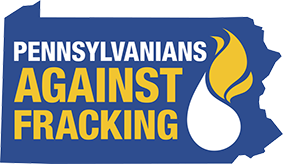| PAF Position Statements
Dirty Gas Has No Place in a Clean Power Plan TPP Is a Fracking Nightmare for Pennsylvania
|
For a century Pennsylvania state government had, in effect, made a Faustian bargain – it had exchanged its environment for the economic prosperity that was built on exploiting our natural resources.
Former Pennsylvania State Representative Franklin L. Kury
In 1971, Pennsylvanians voted by a 4-1 margin to ratify the Environmental Rights Amendment to the Pennsylvania Constitution authored by Kury after the legislature approved it unanimously. Pennsylvanians were well aware of the devastation done by the coal industry, among others. According to Kury, “We were determined this would never happen again.”
Less than a half century later, it’s happened again.
Unconventional natural gas drilling in shale formations like the Marcellus and the Utica is contaminating water, polluting air, destroying habitats, endangering communities, diminishing quality of life, and making people sick.
The drilling process is known as fracking, short for hydraulic fracturing, but it’s commonly used even more broadly to refer to entire process of producing, distributing, and processing shale gas.
GET THE FACTS
Drilling for natural gas is nothing new. We’ve used up most of the natural gas that can be extracted using conventional methods, though, so the oil & gas industry needed to develop the technology to exploit harder to reach deposits of methane in tight shale formations a mile or more underground.
Modern-day, or unconventional, drilling is a dangerous process. We’re still discovering just how
dangerous it is with every spill, well blowout, pipeline failure, compressor station blowdown, earthquake and gas plant explosion, but the dangers aren’t limited to catastrophic events like those.
- Millions of gallons of water are contaminated beyond reuse every time a well is fracked.
- Groundwater is contaminated by the mix of water, chemicals, methane, and anything else released from the shale.
- Methane leaks into the atmosphere at every point in the production, distribution, and processing line.
- We’ve learned from independent testing that known carcinogens and other toxic chemicals are ingredients in the proprietary mixture of chemicals the used in every fracking.
Over the past 24 months, peer-reviewed studies on the impacts of fracking have been published at the rate of one per day. The PSE Healthy Energy study and NY Compendium listed below provide a good overview of the research. You’ll also find links to stories of impacted Pennsylvanians, infrastructure issues, regulatory issues, the politics of fracking, and the real economics of fracking. It’s not all bad news, though, the Solutions Project provides a roadmap to a fossil-free future.
Friends of the Harmed
Shalefield Stories is a compilation of first hand testimonies from people who have been harmed by dangerous drilling in the oil and gas shalefields across the US. Donations collected from this book, will help provide assistance to those who have been harmed by drilling near their homes.
http://www.friendsoftheharmed.com/
List of the Harmed
A continuously updated list individuals and families who have been harmed by fracking.
https://pennsylvaniaallianceforcleanwaterandair.wordpress.com/the-list/
Experts critique a set of ‘voluntary standards’ put forth by the Center for Sustainable Shale Development in the report, Unsafe & Unsustainable, from the Delaware Riverkeeper Network.
http://www.delawareriverkeeper.org/Documents/DRN_Report_Unsafe+Unsustainabl…
Food & Water Watch delivers the bottom line message in its report, The Urgent Case for a Ban on Fracking.
http://www.foodandwaterwatch.org/reports/the-urgent-case-for-a-ban-on-frack…
Concerned Health Professionals of New York, Compendium of Scientific, Medical, and Media Findings Demonstrating Risks and Harms of Fracking (Unconventional Gas and Oil Extraction)
http://concernedhealthny.org/compendium/
PSE Healthy Energy, Toward an understanding of the environmental and public health impacts of shale gas development: an analysis of the peer reviewed scientific literature, 2009-2014
http://psehealthyenergy.org/site/view/1233#sthash.pw8CxZ7J.dpuf
The Solutions Project
http://thesolutionsproject.org/
Fractracker Alliance Map Site
http://www.fractracker.org/
Auditor Generals Report on DEP
http://www.auditorgen.state.pa.us/Media/Default/Reports/speDEP072114.pdf
Energy Policy Forum
http://energypolicyforum.org/
Oil Change International’s Dirty Energy Money Interactive Tool
http://states.dirtyenergymoney.com/
DEP Letters of Determination Confirming Gas Drilling Operation Contaminated Private Wells
http://files.dep.state.pa.us/OilGas/BOGM/BOGMPortalFiles/OilGasReports/Dete…
Delaware Riverkeeper Network: Pipelines a Significant Source of Harm
http://bit.ly/1ysgemr


